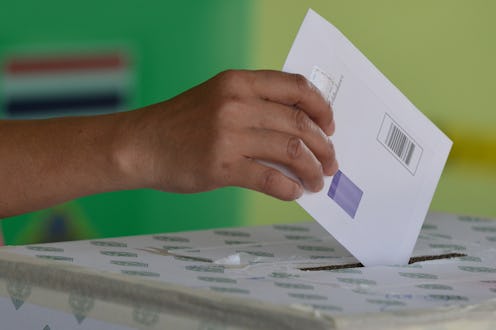News
Political Parties Win With Women On The Ballot
There's a common myth circulating America that no one would vote for a female presidential candidate — well, not no one, but not the majority needed to secure her spot in the Oval Office. But as researchers at the Massachusetts Institute of Technology have pointed out, this myth may be just that — a false notion that has been perpetuated for years but is not true when put to the test. According to a new study out of MIT, political parties actually have more success when women are on the ballot, proving that people will vote for female candidates. But first, they must make it to the ballot.
"We [believe] that it’s not really about voters," said Albert Saiz, the Daniel Rose Professor of Urban Economics and Real Estate in MIT’s Department of Urban Studies and Planning. "It’s about internal dynamics of the parties. There’s some elbowing out going on that leaves women behind."
Saiz co-authored a forthcoming paper, "Women and Power: Unpopular, Unwilling, Or Held Back?" with Pablo Casas-Arce of Arizona State University, that looks into what happens when a country mandates female candidates. The researchers studied Spain's Equality Law, which requires small towns to have women make up at least 40 percent of their candidates on electoral ballots.
The law first took effect during Spain's 2007 elections and has already resulted in significant growth. After looking at nearly 5,000 municipalities, Saiz and Casas-Arce found that not only did the number of female candidates increase, but so did the party's winning percentage. The political parties that increased their number of female candidates by 10 percent more than their opponents had a a 4.2 percentage-point gain on Election Day. Meanwhile, the number of overall female candidates rose by 8.5 percent.
Perhaps most significantly, the researchers found that female candidates did not deter Spanish citizens from voting. In fact, there was no evidence of diminished voter turnout. That puts to rest the idea that voters are turned off by female candidates or see women as lesser politicians than men. "These results are not consistent with the existence of major voter aversion to female candidates," Saiz and Casas-Arce wrote in their paper.
The researchers ultimately concluded that adding women to the ballot can have an overall positive effect on political parties:
According to voter-taste or candidate-ability theories, parties that were fielding fewer women must have done so in order to gain an electoral advantage. However, using a natural experiment provided by the introduction of quotas in Spain, we strongly rejected that view. On the contrary, such parties modestly gained voting share when more women were mandated onto their lists. The results demonstrate that forcing parties to accept more women through quotas can increase female participation without necessarily decreasing their electability. They also suggest that internal party dynamics are important in accounting for female under-representation.
While Americans often have a knee-jerk reaction to the idea of quotas, this new study does make us wonder: Can quotas truly bolster women's success in the public sphere without negatively impacting voters' views? In Spain, it seems like the answer is an unwavering "yes." Although it may seem like Spain is "forcing" female candidates onto voters, it's also clear that when women are fairly represented, they will gain supporters. The hardest part, still, is making it to the ballot.
Images: Getty Images (2)
